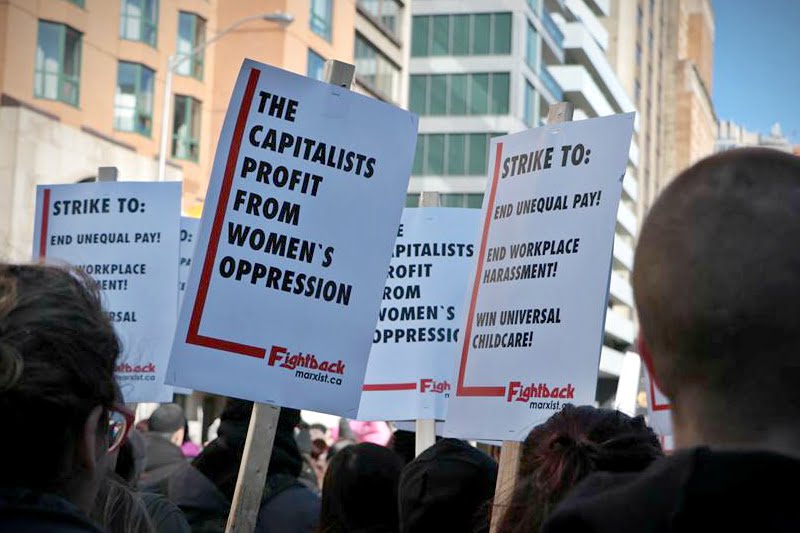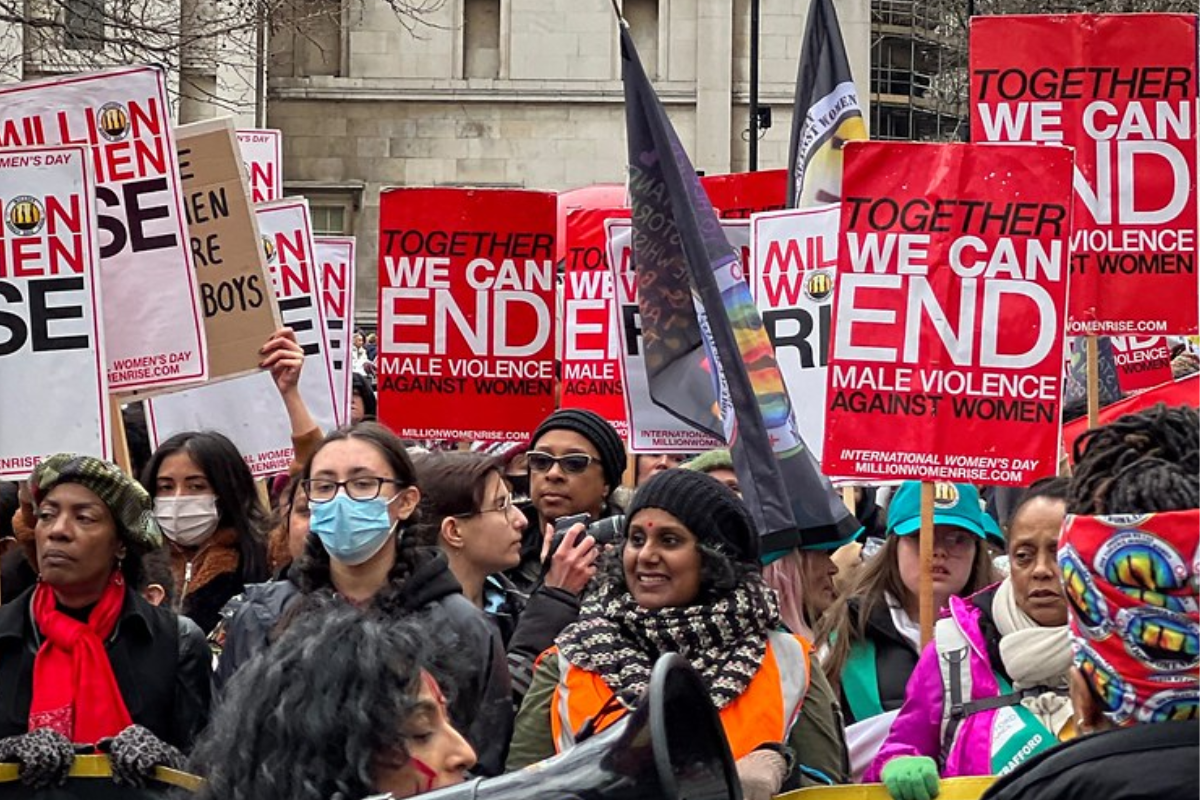8th March is International Working Women’s Day, founded over 100 years ago to celebrate the struggles of working class women. The fight continues today.
We have seen massive mobilisations of women workers across the world in recent times. Women are standing up to fight for better and equal wages; for adequate healthcare and control over our bodies; for services to end the huge amount of unpaid care work women undertake; and against the violence, oppression and discrimination which we face daily.
Last May saw a massive victory for women in Ireland as draconian laws against abortion were overturned by popular vote. The campaign saw a mass mobilisation of young people, who delivered a mighty blow against the forces of reaction. In particular, this was a hit to the power of the Catholic Church, which for many years inflicted untold pain and suffering against Irish women through institutions such as the Magdalene laundries, maintaining a huge influence over the state.
After this great success, the repeal movement must now focus on fighting austerity, which in Ireland means that over 2,000 people travel abroad each year to access healthcare because waiting lists are too long at home. Theoretical rights to abortion mean little if free, accessible and high-quality care is not available. We need proper funding for contraceptive services and education in order to make most unwanted pregnancies a thing of the past.
Equal pay
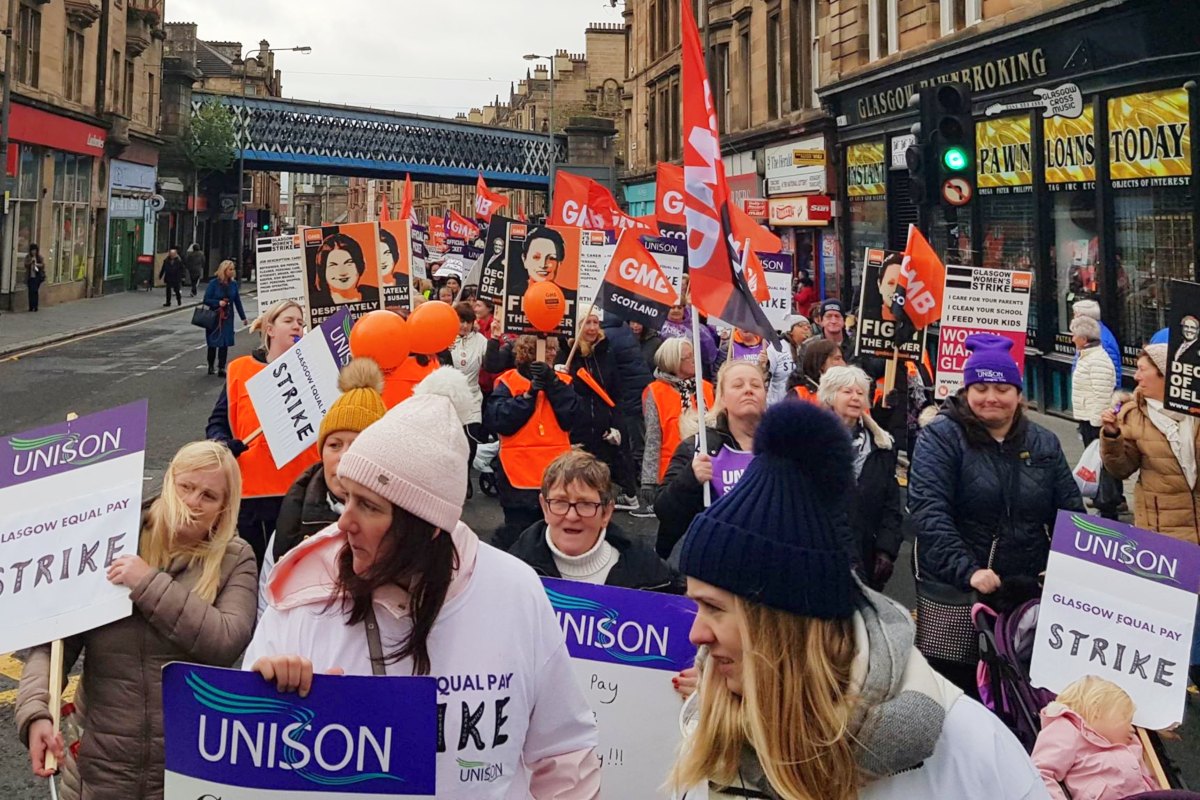 An area where women have equality in theory is equal pay. Despite the Equal Pay Act being passed in 1970, the average wage for women in the UK is just £22,400, compared to an average wage of £33,000 for men. The capitalists use sexism to get away with paying women lower wages, particularly working class women. But they will not get away with this without a fight.
An area where women have equality in theory is equal pay. Despite the Equal Pay Act being passed in 1970, the average wage for women in the UK is just £22,400, compared to an average wage of £33,000 for men. The capitalists use sexism to get away with paying women lower wages, particularly working class women. But they will not get away with this without a fight.
Last month, a court ruling gave hope to 500,000 shop-floor supermarket workers who have been collectively underpaid by around £8 billion in total. The judges ruled that their work is comparable to that of the mostly male and higher-paid warehouse workers.
While we hope that this ruling will provide justice, we should be wary of placing trust in the courts. These are a part of the capitalist state and will always act in the interest of big business rather than the workers.
This was seen in Glasgow recently. Despite court rulings and negotiations, 12,000 underpaid women workers were left in limbo for over 12 years until they decided to take action into their own hands. After 98% of workers voted for strike action, teaching assistants, cleaners and carers went on strike throughout the city, joined by a show of solidarity by male refuse workers who illegally joined the strike to show their support.
After this immense show of strength the council were forced to back down. In January they agreed to payout the £500 million owed. The example of Glasgow shows the importance of militant action from workers in the fight for equality.
Militant action
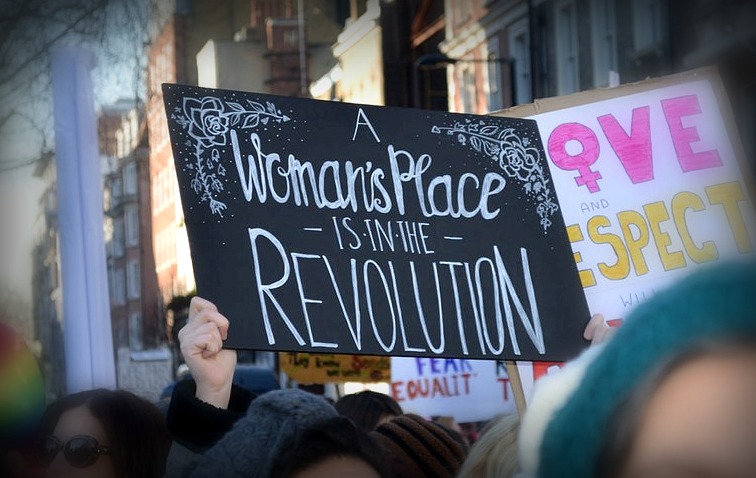 As the capitalist crisis continues to grind away at pay and conditions, more women are becoming involved in militant action to fight for a decent standard of living and a life free from oppression.
As the capitalist crisis continues to grind away at pay and conditions, more women are becoming involved in militant action to fight for a decent standard of living and a life free from oppression.
We have seen large radical movements in Argentina, Poland, Brazil and elsewhere. The most inspiring action yet was the strike of over six million workers in Spain on International Working Women’s Day last year. This was the first time ever that the day has been marked by strike action. Despite only lukewarm support from the trade unions and attacks by the media, this mobilised millions of workers – women and men – in strikes, pickets and marches.
It was clear to many of the women involved just what role capitalism and the state play in upholding and profiting from women’s oppression. Unsurprisingly, the establishment politicians from the right-wing Popular Party and Ciudadanos did not participate in the mass action, highlighting their unwillingness to fight for real women’s liberation beyond empty words, meaningless statements, and providing for women at the very top.
We should be inspired by the recent struggles that have taken place across the world. There is a growing mood of radicalism and an impatience with supposed ‘solutions’ that only benefit the rich and ignore the poor.
Women’s oppression will not be ended by the occasional laws proclaiming equality, or simply by educating individuals not to be sexist. We need revolutionary changes to society to create a system that can guarantee well-paid employment and free high quality childcare and health services for all.
It is through class struggles for our rights – such as abortion rights, equal pay, and decent public services – that women across the world can realise our strength, raise consciousness, and join together with all workers in order to build a socialist society where women’s oppression is a relic of the past.
Women’s strike: what movement do we need?
Susana López and Aura Orbe, Lucha de Clases (Spanish section of the International Marxist Tendency)
 International Working Women’s Day this year will see strikes and mass demonstrations taking place in many countries. In Spain, the unions have once again obtained legal notice for a general strike called by the feminist movement. But what kind of movement do we need to bring an end to women’s oppression?
International Working Women’s Day this year will see strikes and mass demonstrations taking place in many countries. In Spain, the unions have once again obtained legal notice for a general strike called by the feminist movement. But what kind of movement do we need to bring an end to women’s oppression?
Despite centuries of struggle, women remain in a very unfavourable situation with respect to men. They bear the burden of double oppression: as workers and as women. That is why we women have said “enough!”. 8th March has become one of the year’s most important days of struggle.
Working women face all kinds of prejudices when it comes to finding a job, and indeed in the workplace, especially if we are of childbearing age, since employers regard our labour as carrying an additional cost.
That is why large multinational corporations have started offering us the ‘opportunity’ to freeze our eggs so that we do not stop working in the most productive years of our lives, and instead become mothers after the age of 40, when our professional careers are more consolidated. They try to convince us that it means liberation, but in fact it only represents the preservation of business interests.
The companies offering this option to their female employees are now a minority, but are they not forcing women to renounce motherhood? Obviously we respect and support all the decisions of women in this regard, but we denounce this trap disguised as modernity, in which women workers are forced to choose between dedicating ourselves to domestic chores and our families; to generate profit for others by renouncing our family life; or to be slaves of both the family and work. In short, we are forced to live under the yoke of two inseparable systems: patriarchy and capitalism.
Capitalism squeezes out all our productive potential through lengthy working days, temporary contracts that make it impossible to plan for one’s future, and a rhythm of work deepens the inertia of life. Once a woman becomes a mother, the obstacles in her working life multiply. Reduced working hours or maternity leave mean a reduction in social security contributions, which will have significant consequences for pensions in the future. Can we speak of rights if we have to decide between being mothers or maintaining our present income (in the form of wages) and future security (our pensions)?
Defenceless against aggression
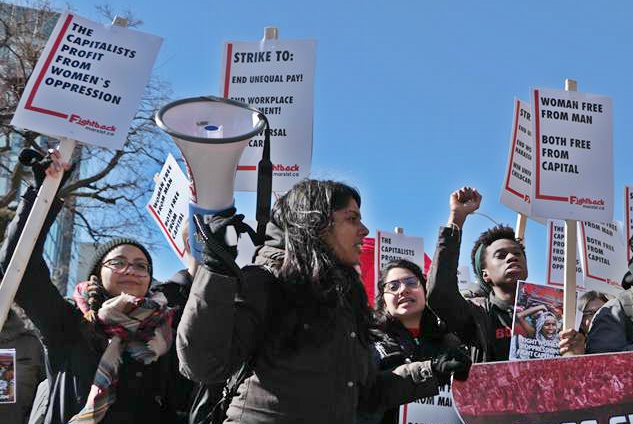 But we not only endure this double oppression in the workplace. According to data from the Spanish government, in 2018, 125,223 incidents of gender-related violence were reported to the police and 47 women were murdered. In addition, in 2017 there were 2,219 reports of rape, of which only 68 percent were investigated.
But we not only endure this double oppression in the workplace. According to data from the Spanish government, in 2018, 125,223 incidents of gender-related violence were reported to the police and 47 women were murdered. In addition, in 2017 there were 2,219 reports of rape, of which only 68 percent were investigated.
We are facing a situation of helplessness when we are physically, psychologically and sexually assaulted. This was demonstrated with the case of “the wolf-pack” in Spain, when a young woman was the victim of a gang rape and came up against the wall of a judicial power inherited from Francoism, which limited itself to condemning those accused for sexual abuse instead of rape.
Working-class women, immigrants or those on low income have to suffer the male chauvinist prejudices of the police and judges, who in many cases ignore our complaints. It is in these concrete cases that the true role of the so-called justice system is revealed: safeguarding the established order of the ruling class.
Commodification of poor women
 But if we talk about violence against women, we cannot ignore one of the worst forms of slavery that women experience: prostitution. It is estimated that there are some 100,000 women who are forced into prostitution either because they are victims of trafficking or because they live in a situation of extreme need. As Marxists we can only oppose the legalisation of prostitution, since it would be legalising the slavery of thousands of women who have no other way to survive.
But if we talk about violence against women, we cannot ignore one of the worst forms of slavery that women experience: prostitution. It is estimated that there are some 100,000 women who are forced into prostitution either because they are victims of trafficking or because they live in a situation of extreme need. As Marxists we can only oppose the legalisation of prostitution, since it would be legalising the slavery of thousands of women who have no other way to survive.
In addition to prostitution, in the last year, the debate on surrogate pregnancy has been fueled. In this practice, a woman rents her uterus in exchange for money to gestate an embryo from a different father and mother. Some liberals label surrogacy as an “altruistic and supportive” act towards two people who want to, but cannot be parents. However, acts of solidarity and altruism are never accompanied by money.
Once again we see how male and, of course, female defenders of capitalism disguise the slavery of women under the mask of modernity and reform.
Class struggle lies behind surrogacy: wealthy men and women pay a poor woman to gestate an embryo for them. It is an act that, just like prostitution, is done out of pure necessity. An act that would not be carried out if the women who rent their uterus had their material needs catered for. How many rich women lend their uterus to this “altruistic” cause?
That is why we must strive to create the necessary material conditions that allow a dignified life, without having to resort to turning our bodies into commodities. That means guaranteeing employment for the entire working class and unemployment benefits equal to the minimum wage for those without a job. Only in this way will the foundations be laid for a new society that will eradicate all the forms of slavery women workers endure under patriarchy and capitalism.
A struggle of women alone?
 The struggle for equality is not only a matter of gender, it is also a matter of class. Our natural allies are our partners in the working class, and not bourgeois women. They themselves reject the call for strike action. The women representatives of right-wing political parties are only forced to go to the demonstrations, very reluctantly, by the movement of millions of women and men against patriarchy. They are defenders of and privileged by the capitalist system, and they themselves (as businesswomen or in the political sphere) carry out actions that oppress women workers.
The struggle for equality is not only a matter of gender, it is also a matter of class. Our natural allies are our partners in the working class, and not bourgeois women. They themselves reject the call for strike action. The women representatives of right-wing political parties are only forced to go to the demonstrations, very reluctantly, by the movement of millions of women and men against patriarchy. They are defenders of and privileged by the capitalist system, and they themselves (as businesswomen or in the political sphere) carry out actions that oppress women workers.
Therefore, we do not share the idea that male workers and activists should be excluded from the tasks of organisation and participation in the strike and demonstrations on 8 March. The best way to combat the prejudices that many of our male colleagues still have towards the struggle of women is to incorporate them into our struggle and make them aware of our problems.
The experience of the strike and demonstrations (in Spain and elsewhere) last year showed that the idea of a day of mobilisation exclusively for women did not connect with the needs and instincts of the young women and women workers. Everywhere, masses of young people of both sexes overflowed the demonstrations, ending attempts to establish non-mixed blocks.
Young students of both sexes participated in strike pickets at universities. And, of course, in the factories and workplaces, the strikes had a greater impact the more male workers were involved in them, rather than being relegated to covering for their female counterparts.
The programme we defend as Marxists includes:
- Equal work for equal pay.
- 16 weeks of non-transferable maternity and paternity leave.
- A 30-hour working week for men and women, allowing for a balance of work and family life so that women are not forced to reduce their working hours and salaries to carry out domestic chores and rear children.
- State nurseries and dining halls in every neighbourhood and workplace with 50 or more workers.
- A housing plan for women victims of domestic abuse, who are economically dependent on their aggressors, without the need to file a police report.
- The general incorporation of ‘housewives’ into productive work outside the home, rather than offering wages for housework.
- An unemployment subsidy equal to the minimum wage for all unemployed women.
Only with an effective strike for these demands will we be in a position to put the system on the ropes. Only then will we be in a better situation to fight for an end, not only to our oppression as women, but also to the oppression that we suffer as workers.

